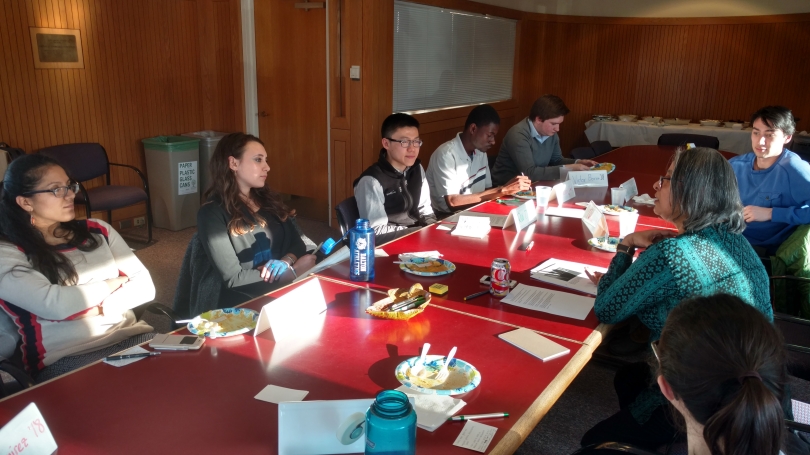
- Public Policy
- Leadership
- Funding
- News & Events
- About the Center
Back to Top Nav
Back to Top Nav
Back to Top Nav
Back to Top Nav
The Deputy Director of the Rockefeller Center, Sadhana Hall, sat down with a small group of students on Tuesday April 5, 2016 to share the lessons she has learned in her dynamic and multifaceted professional life. Starting off by asking students the definition of health as defined by the World Health Organization (WHO), Sadhana explained how she got involved with public health as a career before joining the Rockefeller Center. The WHO definition of health since 1948 has been: “Health is a state of complete physical, mental and social well-being and not merely the absence of disease or infirmity” [1]. Growing up in India, Sadhana had not contemplated a career in public health, which was not one of the three popular career choices – medicine (as in curative medicine), engineering, and computer science. However, it was Sadhana’s future husband Rick who inspired her to appreciate the value of preventative medicine, which addresses the full spectrum of health needs in accordance with the WHO definition of health. “My husband is adorable,” said Sadhana amiably as the students smiled back. From then on, Sadhana has worked for more than 20 years with communities in Tuvalu, Bhutan, and the Cacasus, helping implement programs in health, agriculture, economic development, and water supply. Sadhana then led a short exercise for students to brainstorm what factors would appear in the cycle from economic development and health, topics that intrigued this group of students who are interested in medicine, public health, and health policy.
After sharing her public health work experience, Sadhana transitioned to the second part of her talk – management and leadership. She started by sharing how she formed her famous definition of integrity: Integrity is keeping your words, nothing more, and nothing less. For the next 10 minutes, students were completely drawn to Sadhana’s story. It is a story about a debilitated young woman whom Sadhana was trying to save yet who lost her life eventually due to someone in power not keeping his promises and his words. Using the story as a springboard, Sadhana asked the students to reflect on what values were important to them and how to translate those values into leadership presence and actions.
At the end of the session, students asked questions on Sadhana’s upbringings in India, how she developed her sense of humor, and how she saw herself in 5 or 10 years. The one-hour session felt simultaneously long and short as the students witnessed the life journey of an admirable mentor unfold in front of them like a movie.
-Submitted by Rui Zhang '16
[1] Preamble to the Constitution of the World Health Organization as adopted by the International Health Conference, New York, 19-22 June, 1946; signed on 22 July 1946 by the representatives of 61 States (Official Records of the World Health Organization, no. 2, p. 100) and entered into force on 7 April 1948.